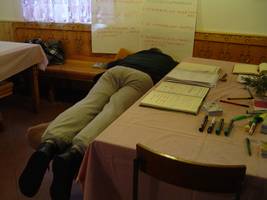The features of study circles

Tired mentor
Study circles represent an organised infrastructure for adult self-learning, of which a process of voluntary, creative and democratic cooperation mixed with respectful productive discussion is typical.
It begins with a socio-cultural animation and ends with an action. During the process the reconciliation of work and care for the common good are present. The typical elements of the meeting are: greeting, rules, discussion, summary and advance planning, evaluation.
Personal communication is typical of study circles. In order to preserve this feature a connection enabling the choice to prevail over control and allowing the usage of inner powers must be established. Social circumstances encourage self-learning; and which therefore contain the smallest possible amount of attempts of dominance and apathy. Communication is not always direct and it takes time similarly to the establishment of the connection. As all other processes, communication may be slow in progress and costly, as well as boring, therefore inner sources, good intentions, honesty and tolerance play the key role.
The participants connect on the level of the content, relationships or values, and for that reason empathy and time are needed to re-experience, to create inner images and evoke feelings, which individuals perceive selectively and in harmony with their experience, the latter work as a physiological and psychological filter.
Learning in study circles creates the concrete conclusions – products, events, reconciliation of viewpoints, personal closeness and openness to novelty intertwined with strong identity on all levels.





